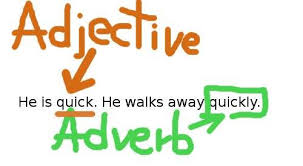Overview
Modifiers are words, such as adjectives or adverbs, or phrases, such as prepositional phrases, that add description to other words in a sentence. Check to see if they are used in the correct form and location when editing an essay.
Adverb or Adjective?
Adverbs and adjectives are similar modifying words that take different forms and endings. Usually, the adverb form ends with the suffix –ly and the adjective does not (although there are exceptions). In order to choose the correct form for each sentence, draw a line between the modifier and the word it modifies.
Adverbs Modify Verbs
If the word modifies the verb, it should take the adverbial form. Adverbs give additional information about the action of the verb, its manner, place, time, frequency, or circumstances. Adverbs can also modify adjectives, and can be single words or entire phrases. For example, in the sentence “She sang loudly,” the adverb loudly modifies the verb sang, giving more information about how she sang. In the sentence, “He drove on the freeway,” the prepositional phrase “on the freeway” modifies the verb drove, giving more information about where he drove.
Adjectives Modify Nouns
If the word modifies a noun, it should take the adjective form. Adjectives give more information about that noun, such as “The red-headed woman sang loudly,” or “The man with the yellow hat drove on the freeway.” Some adjectives also end in –ly, such as lovely, lonely, and friendly.
Cautions in Modifying – Good or Well?
The word good is an adjective, modifying a noun, as “the good wife.” The word well is an adverb, modifying a verb or adjective, such as “The child plays well with others.” However, if the verb is taste, appear, seem, or look or another linking verb, it is correct to use the adjective good, such as “The fruit tastes good.” In that case, good is describing the fruit. The formal exception is when describing health, such as “feeling well.”
Watch More and Most
The modifiers more and most already compare items, such as “more cheese” or “most toys.” It is redundant in English to also use the comparative ending –er or the superlative ending –est in the same description. In a sentence such as “Chocolate ice cream is more better than vanilla ice cream,” the word more is redundant, so the sentence could be recast as “Chocolate ice cream is better than vanilla ice cream.” Similarly, “The most angriest customers ask to speak to the supervisor” could be recast as “The angriest customers ask to speak to the supervisor.”
Verbal Nouns
Verbal nouns are formed by adding the suffixes –ing or –ed to a verb form. They can be used as adjectives as “the whistling wind” or “the blackened corn.” When a verbal noun is used as an adjective, make sure whatever it modifies is close to it in the sentence.
Misplaced Modifiers
If a verbal noun or entire phrase is used as a modifier, make sure it is the closest to what it modifies. Otherwise, the modifier is dangling, and the sentence may not make sense. For example, a sentence such as “While barbecuing the hamburgers, the tomatoes were cut” has a dangling modifier, as the hamburgers cannot cut the tomatoes. It can be recast as “While barbecuing the hamburgers, she cut the tomatoes.”
Interested in English tutoring services? Learn more about how we are assisting thousands of students each academic year.
SchoolTutoring Academy is the premier educational services company for K-12 and college students. We offer tutoring programs for students in K-12, AP classes, and college. To learn more about how we help parents and students in Cape Coral, FL: visit: Tutoring in Cape Coral, FL




